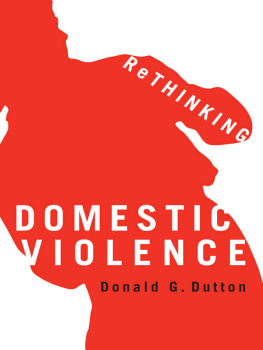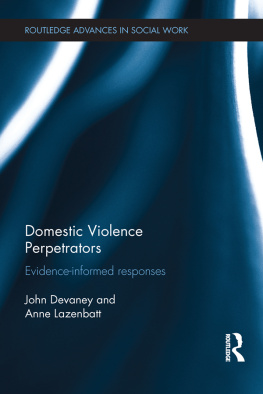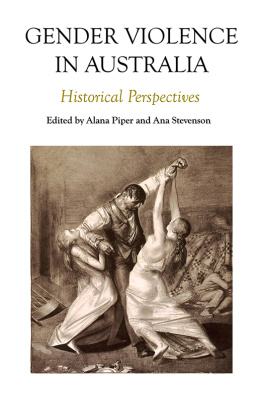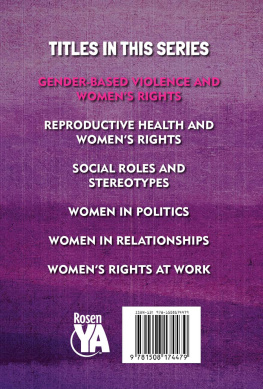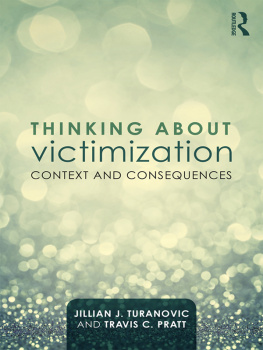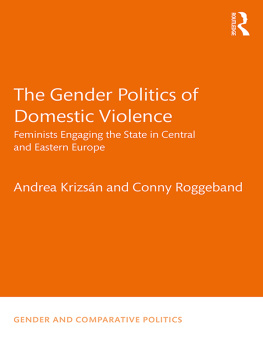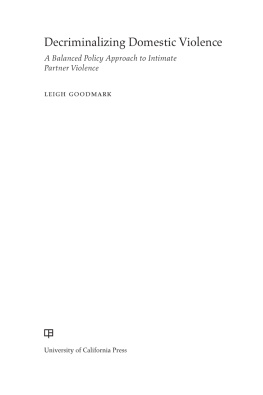Rethinking Domestic Violence
Rethinking Domestic Violence
DONALD G. DUTTON

UBC Press 2006
Print edition originally published 2006
eBook edition 2013
All rights reserved. No part of this publication may be reproduced, stored in a retrieval system, or transmitted, in any form or by any means, without prior written permission of the publisher, or, in Canada, in the case of photocopying or other reprographic copying, a licence from Access Copyright (Canadian Copyright Licensing Agency), www.accesscopyright.ca.
ISBN 987-0-7748-5987-5 (ebook)
ISBN 987-0-7748-1304-4 (hardcover)
ISBN 978-0-7748-1015-9 (paperback)
Library and Archives Canada Cataloguing in Publication
Dutton, Donald G., 1943
Rethinking domestic violence / Donald G. Dutton.
Includes bibliographical references and index.
ISBN-13: 978-07748-5987-5
ISBN-10: 0-7748-1304-0
1. Spousal abuse. I. Title.
HV6626.D885 2006 362.8292 C2006-901261-X

UBC Press gratefully acknowledges the financial support for our publishing program of the Government of Canada through the Book Publishing Industry Development Program (BPIDP), and of the Canada Council for the Arts, and the British Columbia Arts Council.
UBC Press
The University of British Columbia
2029 West Mall
Vancouver, BC V6T 1Z2
604-822-5959 / Fax: 604-822-6083
www.ubcpress.ca
TO MARTA, MY WIFE AND LIFE COMPANION
The tragedy for me is that I had a vision whereby people who were infected by dysfunctional and violent parenting could find a place that would give them a chance to learn how to live in peace and harmony. This dream was destroyed along with all my evidence and projects. The feminist movement resolutely refuted any argument that women should be allowed to take responsibility for their choice of relationships. The image of women as victims, as helpless childish dependents upon brutal men worldwide, has damaged relationships between the sexes.
Erin Pizzey (founder of the first womens shelter in England), Domestic Violence Is Not a Gender Issue
Contents
Lastly, there are idols which have immigrated into mens minds from the various dogmas and philosophies, and also from wrong laws of demonstration. These I call idols of the theatre, because in my judgment all the received systems are but so many stage-plays, representing worlds of their own creation.
Francis Bacon, Novum Organum
Two major social phenomena concerning gender have occurred during the latter part of the twentieth century in most North American and Western European countries. Womens rights have finally been acknowledged after centuries of religion-based political repression. Also, the violence occurring against women in intimate relationships has finally been exposed.
In patriarchal countries, violence against women still persists as a right that men believe they have. I was reminded of this during a recent speech in Rome where a therapist told me of cultural practices in Sardinia, which include a mans duty to kill his wife if he believed she was cheating on him (and destroying family honour). Family honour societies are typically highly religious.
For these historical reasons (see ), it has been tempting for feminists to view intimate violence as part and parcel of the domination of women. This is true for societies that remain truly patriarchal. In North America, however, a different data pattern has begun to emerge, one that also follows from a feminist model but not from a woman-as-victim model. In Canada and the United States, women use violence in intimate relationships to the same extent as men, for the same reasons, and with largely the same results. As will be described in Chapters 5 and 6, this notion was originally dismissed as fictional, the violence thought to be self-defensive, or the consequences trivial. The data strongly suggest otherwise, despite a research agenda that can only be described as attempted dogma preservation.
What has occurred in North American governments at national and local levels has been a simplistic conceptualization of intimatepartner violence (IPV) that has resulted in a denial of violence against men and also of bilateral complicity in violent couples. This has led to a prohibition on treatment that could better benefit victims of intimate abuse both males and females and a reliance on superficial psychoeducational models that are limited to attitudes. Because of a need to find a bad guy generated from adaptation of the Marxist view of the bourgeoisie to fit men in general considerable distortion of the data of IPV has occurred. This conceptualization has generated arrest policies (see ) and treatment policies (Chapter 14) that forbid treatment. Yes, thats correct, forbid treatment, replacing it with what is called intervention, which is really no more than thought reform as described in Robert Liftons great work, Thought Reform and the Psychology of Totalism. The mindset of women as victims is enshrined in legal and government policy structures, where homeostasis now operates against effective policy.
Despite this political myopia, some impressive research has charted abusiveness in both genders and over long periods of time. We now know from the work of Terrie Moffitt and her colleagues (discussed in Chapter 7) that we can predict perpetration of IPV as early as age fifteen in both genders. Some of my own retrospective work on convicted male abusers and that of others (especially the groundbreaking work of Alan Schore on affective neurodevelopment) suggests much earlier origins (see ). Neglect of essential conditions for secure attachment and child rearing is a huge contributor to adult abusiveness.
In this book I have limited policy issues to after the fact intervention for intimate abuse. It is most obvious, given these early developmental antecedents, that prevention of abuse must start at birth. In fact, according to the work of Schore (described in Chapter 4), the first eighteen months of life allow healthy or unhealthy development of neural structures that govern emotion. Intimate relationships inevitably generate emotion, and behaviour in these relationships is being shaped from birth. Schores work also shows how maturational windows recycle and provide therapeutic opportunities into adulthood.
It may be that public policy for adult IPV regulation is following a dialectical course. The thesis would have been the period of neglect of the topic up to the early seventies; the antithesis is surely the simplistic paradigm that exists today: that all perpetrators are male and all victims female. The evidence is overwhelmingly against this view, and the phenomenon of interest now is the slavish adherence to an ineffectual ideology to the point of suppressing its very goal: diminution of IPV. One hopes for a synthesis in which the complexities of subtypes of couple violence patterns, motives, sexual orientation, and personality disorders are assessed by professionals, replacing the one size fits all monolithic model currently in practice. Intimate-partner violence exists in heterosexual, gay, and lesbian couples and across cultural groups and social strata. Whatever variations are introduced by these group memberships rest on top of a universal issue: intimacy and how to handle it. Ernest Beckers insightful words in the epigraph at the beginning of this preface point to the dyadic and problematic nature of relationship in the human condition.
Existing approaches to family violence intervention are examined in this book (Chapters 12, 14, and 15) and found lacking. The research evidence from the best-designed studies those that use representative community samples and study them longitudinally (see ) finds a personality disorder in the majority of people who abuse intimates. The success of intervention strategies rests largely on the type of person to whom they are applied. This is true regardless of whether a couple is heterosexual or homosexual. In cultures where intimate abuse is not normatively acceptable (as is the case in North America), personality disorders represent the complex of ideas that generate counter-normative behaviours. This reality has been concealed by misleading theories that wife assault is normatively acceptable, an absurd assertion without empirical support.
Next page
